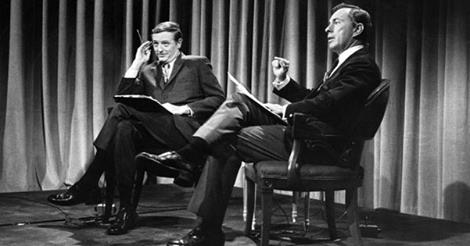It was 1968 and another U.S. presidential election season was in the offing.
With the Republican and Democratic Party conventions coming up, the ABC television network, trailing behind the CBS and NBC networks, needed a compelling media event to increase its audience share.
ABC settled on a debate that would pit William F. Buckley, a conservative, against Gore Vidal, a liberal. It was a shot in the dark, but it worked brilliantly, changing the nature of TV.
Forty seven years on, the legendary Buckley-Vidal debate remains a masterpiece of rhetoric and recrimination. They were supposed to discuss current issues like the war in Vietnam and the racial divide in America, but instead, they vilified each other, espousing radically different visions of America. And being so literate, they did so in elegant and sardonic fashion, prompting moderator Howard K. Smith to describe them as “craftsmen of the English language.”
Their classic debate, which unfolded over nine separate nights, is the subject of Best of Enemies, which will be screened at the Canadian International Documentary Festival (Hot Docs). It runs in Toronto from April 23-May 3.

Riveting and entertaining, the film focuses its attention on two gifted debaters at the height of their powers. Although they despised each other, they were both from the same patrician Anglo-Saxon eastern elite, enunciating their complex sentences in plummy, affective and disdainful tones.
Buckley, who had a strong opinion about everything, was the editor of the right-wing National Review magazine, the voice of the American conservative movement. Vidal, the enfant terrible of the American literary scene, was a published novelist and screenwriter who sought a new political and social order in the United States.
Buckley regarded Vidal, a gay man, as an apostate who had betrayed his class and a subversive who was undermining America. Vidal considered Buckley an elitist and a paragon of the anti-democratic right.
In a stinging riposte, Vidal called the National Review “your little magazine.” Hitting back, Buckley said, “Anything complicated confuses Mr. Vidal.” Landing another blow, Vidal exclaimed, “Buckley is always on the right and always in the wrong.”
As they sparred, their verbal firecrackers exploding incandescently, they grinned and grimaced. Although they mocked and interrupted each other constantly and mercilessly, much to the probable delight of ABC, they reached an implicit understanding that they were intellectual equals.
The debate reached its ugly climax when, in a particularly heated moment, Vidal accused Buckley of being a “crypto-Nazi.” Smarting from Vidal’s below-the-belt blast, Buckley launched his own fusillade, branding Vidal a “queer” and threatening to punch him in the face.
Mortified by their acrimonious exchange, Smith said it had contributed more heat than light, a polite way of saying that the pair had departed from the norms of civility. Subsequently, they continued their lively debate in the pages of Esquire and sued each other.
Although Buckley and Vidal are at the center of this fast-moving documentary, Best of Enemies features lucid comments from media critics who dissect their debate and and place it in historic perspective.